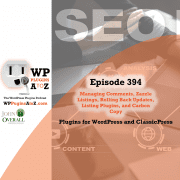The Idiots Guide to Configuring WordPress
Author: Richard Taylor
Wordpress is simply the best blogging platform on the planet! Being open source software, developers around the world have produced hundreds of plugins to enhance its basic functionality, as a result blogging has never been easier, and the search engines love it!
Blogging with WordPress offers two huge advantages:
1. It's FREE to download and use
2. The Search Engines, in particular Google, love WordPress blogs
WordPress is open source software, which means it's free to use. When you choose a hosting account, try and choose one that uses a control panel called “CPanel”, because installing WordPress becomes as easy as clicking a handful of icons, it really is simple!
So you've bought a domain name, found a hosting company with CPanel and installed WordPress on your new domain! In theory you're ready to make your first post! But before you do, read on!
Before you post, you need to configure your blog and optimise it for the search engines, doing this before you post makes life a lot easier for the future.
As WordPress is open source, developers around the world have written literally hundreds of plugins that enhance the functionality of your blog, and again the majority are free to install. Take a look at WordPress.org where you'll find hundreds of free plugins. Ones I recommend are:
– Installer (install this one first, simplifies plugin installations)
– All In One SEO Pack (optimises your posts)
– Adsense Manager (adds Adsense blocks to your posts)
– Google XML Site Maps (creates a site map for your blog)
– Ultimate Tag Warrior (essential plugin for managing tags)
– Sociable (assists with social bookmarking)
Next, within your dashboard, select Options in the menu and then Permalinks. You need to change the settings on this page in order to optimise your post's url for the search engines, this change will ensure your keywords appear in the url. In the Custom Options box, insert the following text:
/%category%/%postname%/
Typing this will optimise your posts, but you must be careful only to ever select one category per post in the future, and not change a post's category after you've published it!
When you post with WordPress, it automatically notifies (known as pinging) blog directories of your new content, they index it based on the tags you assign. The search engine robots regularly visit these directories, and as a result your new post will be indexed by them very quickly. Rapid indexing is one of the huge advantages of blogging!
In your blogs configuration, you should add as many directory sites as possible to ping, in addition to the default url. Simply search on the web for “ping list”.
Finally, you need to optimise the appearance of your site. You don't want to use the basic template that comes with WordPress. If you do a search online for WordPress themes, you'll find hundreds to download for free.org again in their themes directory. Whilst there are hundreds of free themes around, I never seem to find one that perfectly meets my needs, so I often end up buying one!
Once you've installed the theme of your choice, activated all of your plugins, and made the configuration adjustments I've recommended, you're ready to post, so what are you waiting for!
About the Author:
Get a copy of my personal “ping” list at http://www.essentialseotools.com/seoblog , where you'll also find lots more information and tips on blogging with WordPress. For some great looking themes visit Instant WordPress Themes.
Article Source: ArticlesBase.com – The Idiots Guide to Configuring WordPress




